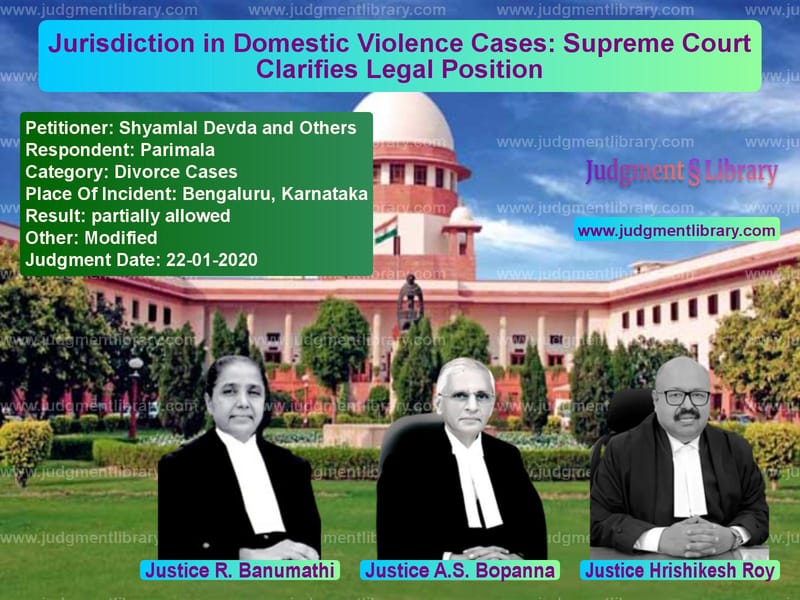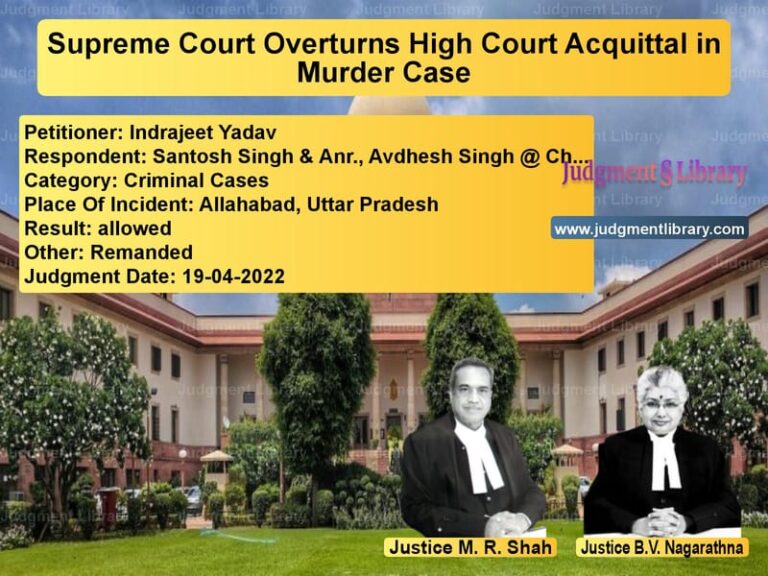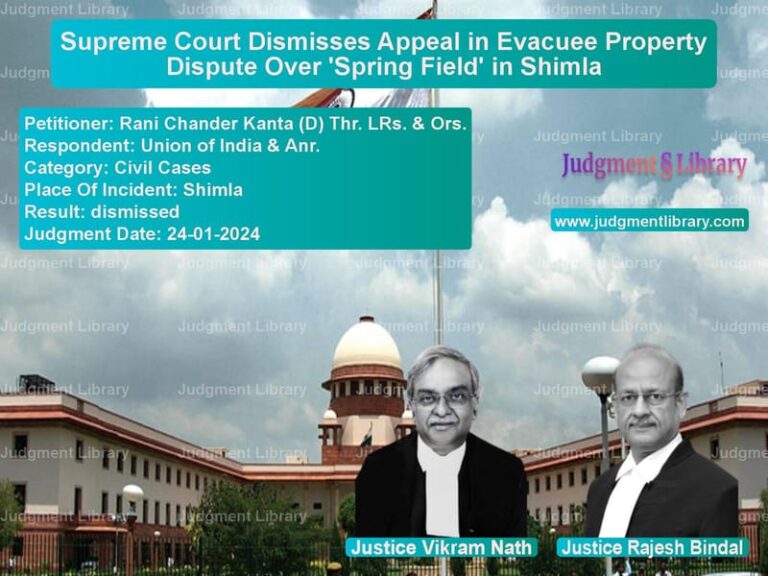Jurisdiction in Domestic Violence Cases: Supreme Court Clarifies Legal Position
The case of Shyamlal Devda and Others vs. Parimala deals with the critical question of jurisdiction under the Protection of Women from Domestic Violence Act, 2005. The Supreme Court analyzed whether a wife can file a domestic violence complaint in a city where she resides temporarily and whether all accused family members, including those residing in different states, should be implicated in such complaints.
The ruling is a landmark judgment clarifying the jurisdictional limits of courts in domestic violence cases and protecting individuals from frivolous complaints filed at remote locations to harass accused family members.
Background of the Case
- The marriage between Parimala (respondent-wife) and Manoj Kumar (appellant No. 14) was solemnized on May 1, 2006, in Rajasthan.
- After marriage, the respondent resided with her husband in Chennai along with her in-laws (appellants No. 1 and 2).
- In April 2014, the couple traveled to Bengaluru to attend the respondent’s sister’s wedding.
- After the wedding, the respondent decided to stay back at her parental home in Bengaluru, refusing to return to Chennai.
- Her husband filed a petition for restitution of conjugal rights under Section 9 of the Hindu Marriage Act in Chennai.
- The respondent then filed a domestic violence complaint in Bengaluru, naming 14 family members, including individuals from Rajasthan and Gujarat.
- The Metropolitan Magistrate, Bengaluru, issued summons to all accused based on the complaint.
Legal Issues Considered
- Whether the Bengaluru Metropolitan Magistrate had jurisdiction to entertain the complaint.
- Whether individuals residing outside Karnataka could be made parties to the domestic violence case.
- Whether the allegations against the extended family members were specific or vague.
- Whether the complaint was filed with the intent to harass the husband’s relatives.
Arguments of the Appellants (Husband and His Family)
- The appellants argued that the marriage took place in Rajasthan, and the matrimonial home was in Chennai.
- They contended that the wife had voluntarily chosen to stay in Bengaluru and had no valid reason to file a case there.
- The inclusion of distant relatives from Rajasthan and Gujarat was an attempt to harass them.
- They claimed that the allegations against the extended family members were vague and unsubstantiated.
- The petitioners sought the quashing of the proceedings against family members who had no involvement in the alleged acts of domestic violence.
Arguments of the Respondent (Wife)
- The wife argued that under Section 27 of the Domestic Violence Act, a complaint can be filed where the “aggrieved person permanently or temporarily resides.”
- Since she was residing in Bengaluru, she claimed the Metropolitan Magistrate had jurisdiction to hear the case.
- She alleged that her in-laws had taken away her jewelry and forced her to buy properties in Chennai.
- She contended that she was subjected to mental and physical harassment by her husband and his family members.
Supreme Court’s Observations
- The Court reaffirmed that Section 27 of the Domestic Violence Act allows complaints to be filed where the aggrieved woman temporarily or permanently resides.
- However, the Court noted that the allegations against appellants No. 3 to 13 (extended family members) were general in nature.
- The Court held that complaints should not be used as a tool to harass distant relatives who had no active involvement in domestic violence.
- It observed: “There are no specific allegations against the extended family members, and their inclusion in the case appears to be an abuse of the process of law.”
- The Court ruled that the complaint against the husband and in-laws (appellants No. 1, 2, and 14) could continue, but it quashed proceedings against other accused family members.
Final Judgment
The Supreme Court issued the following directives:
- The domestic violence case could continue against the husband and in-laws (appellants No. 1, 2, and 14).
- The proceedings against appellants No. 3 to 13 (distant relatives) were quashed.
- The Bengaluru Metropolitan Magistrate had jurisdiction to hear the case since the complainant was residing there.
- The trial court was instructed to proceed with the case against the remaining accused and dispose of the matter in accordance with the law.
This judgment sets a precedent for preventing misuse of the Domestic Violence Act while ensuring that genuine complaints are heard in appropriate jurisdictions.
Petitioner Name: Shyamlal Devda and Others.Respondent Name: Parimala.Judgment By: Justice R. Banumathi, Justice A.S. Bopanna, Justice Hrishikesh Roy.Place Of Incident: Bengaluru, Karnataka.Judgment Date: 22-01-2020.
Don’t miss out on the full details! Download the complete judgment in PDF format below and gain valuable insights instantly!
Download Judgment: Shyamlal Devda and O vs Parimala Supreme Court of India Judgment Dated 22-01-2020.pdf
Direct Downlaod Judgment: Direct downlaod this Judgment
See all petitions in Domestic Violence
See all petitions in Alimony and Maintenance
See all petitions in Legal Malpractice
See all petitions in Judgment by R. Banumathi
See all petitions in Judgment by A. S. Bopanna
See all petitions in Judgment by Hrishikesh Roy
See all petitions in partially allowed
See all petitions in Modified
See all petitions in supreme court of India judgments January 2020
See all petitions in 2020 judgments
See all posts in Divorce Cases Category
See all allowed petitions in Divorce Cases Category
See all Dismissed petitions in Divorce Cases Category
See all partially allowed petitions in Divorce Cases Category







